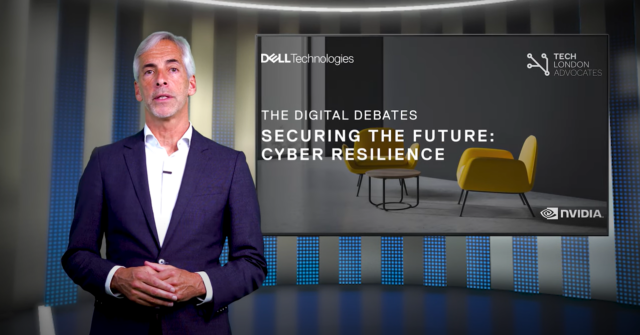
At Dell Technologies, our mission is to drive human progress. And there is perhaps no bigger threat to this mission than that of cyber attacks.
Today, organisations must operate under the assumption that no matter how great their barriers are, bad actors will find a way in. And so, a better approach is to build resilience and plans for recovery, to ensure businesses can get back to viable operations, without having to fund the culprits.
Regardless of the industry you are in, the process is the same. Get your crown jewels in an isolated, immutable vault and continuously run intelligence on those data sets to ensure we can restore to a clean copy in the event of a destructive cyber attack.
“As the landscape evolves and threat actors become more sophisticated, so must we.
The variation that changes is the data. But we have been able to share blueprints with our customers across industries, enabling organisations to take their power back without fear.
I sat down with Tech London Advocates (TLA) founder Russ Shaw CBE, alongside four leading figures in the cyber industry – Oz Alashe MBE, Founder and CEO of CybSafe; Oge Udensi, Principal, Cyber Security at UK Finance; Eleanor Fairford, Deputy Director for Incident Management at the National Cyber Security Centre (NCSC); and Bartley Richardson, Senior Manager of AI Infrastrucute at NVIDIA – for the latest in our series of Digital Debates with TLA and NVIDIA.
We discussed how we leverage emerging technologies to build resilience, and work together to ensure the UK has the capabilities to respond to threats, both locally and globally. Here were my key take-aways from the conversation.
Collaboration will be at the heart of UK cyber success
Our debate reflected on the recently updated National Cyber Strategy, which sets out a vision for the UK to grow its cyber capabilities and become a more secure and resilient nation over the next decade. This built on a previous strategy, which ran from 2016-21 and led to the establishment of the NCSC and other key cybersecurity infrastructure in the UK.
The previous five years have led to systemised collaboration in the industry, from Government through to the private sector. These partnerships have also accelerated the capabilities of small- and medium-sized businesses, who today recognise the importance of cybersecurity to their operations.
There is also a role for international collaboration, as shared by NVIDIA’s Bartley Richardson, who advocated for the use of AI strategies for intelligence sharing across borders
The next step is a wider upskilling in the industry. As the landscape evolves and threat actors become more sophisticated, so must we. And so, it will be crucial to leverage the expertise of existing talent in cybersecurity, to build a more resilient nation.
Cyber strategies must be about people
CybSafe data found that human error leads to 90% of data breaches. But we should not consider people to be “the problem” when it comes to building successful cyber resilience strategies. Human behaviour is a reality and cybersecurity should serve the interests of people in organisations and society. If the reality that human beings make mistakes, even with the best training in the world, is not factored into a strategy, then it is incomplete.
“We need bold action from leaders to open up opportunities for talent from more diverse backgrounds, just as we use technology to find bold solutions to societal challenges.
Organisations therefore must put all of the necessary processes in place, such as zero trust infrastructure, to best reduce the possibilities of human error lead to a cyber breach.
Education however, must be at the heart of any strategy. If you can turn your people into a human firewall, then technology will act as your fail safe, for when natural human error occurs. But if you can filter out the majority of entry points for breaches through training, then that is crucial.
An inclusive industry will be a better industry
To successfully train employees in cyber resilience, you need a strong pipeline of talent coming into the sector. That means making cybersecurity an accessible industry for people of all backgrounds, to increase diversity of thought and innovation. Currently in the UK, the largest proportion of talent and investment into the sector is found in London and the South East. The establishment of national hubs in other areas of the country, will be crucial to mobilising a broader demographic.
Another important step will be in welcoming people into the industry from non-technical backgrounds, understanding the broader range of transferable skills that can be applied to cyber.
Finally, change has to come from the top. Whether it is in developing more inclusive language sets or leadership opportunities within organisations, young talent must see it to believe they can be it. And so, we need bold action from leaders to open up opportunities for talent from more diverse backgrounds, just as we use technology to find bold solutions to societal challenges.
To find out more, you can watch the full Digital Debate here.


